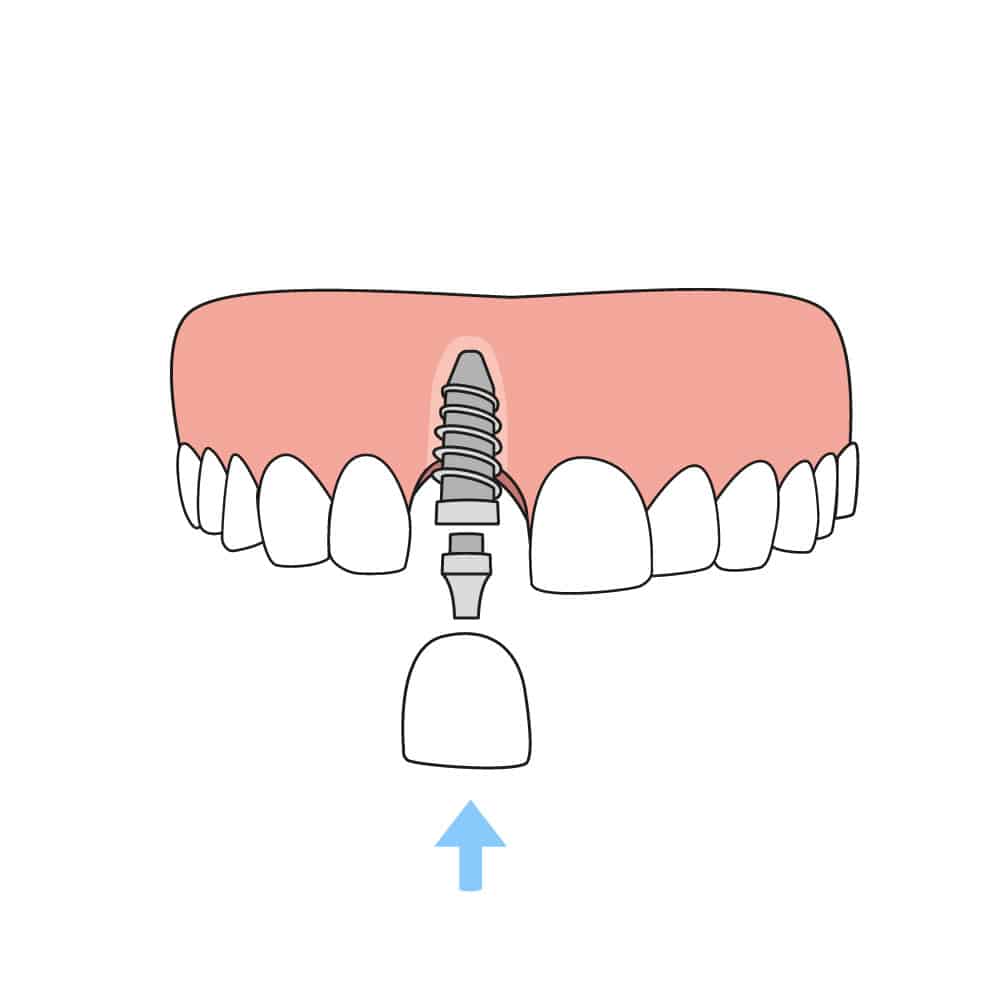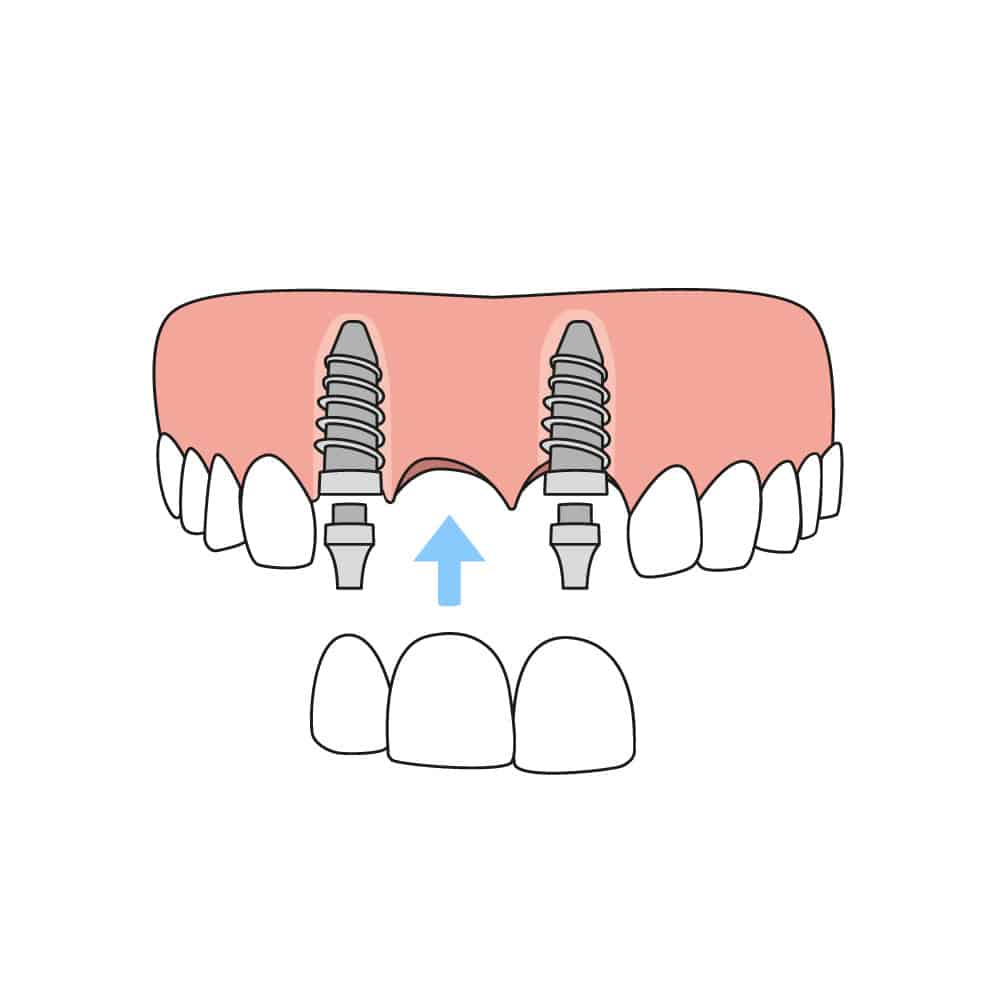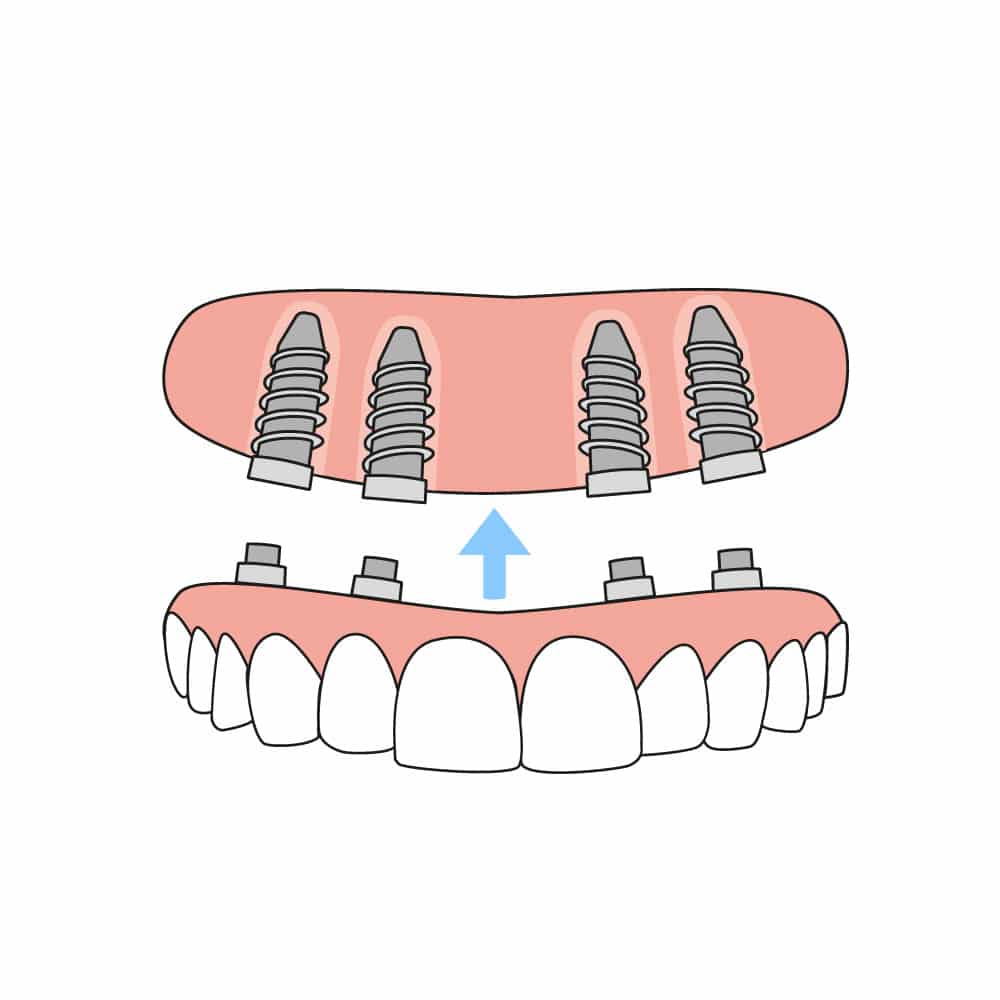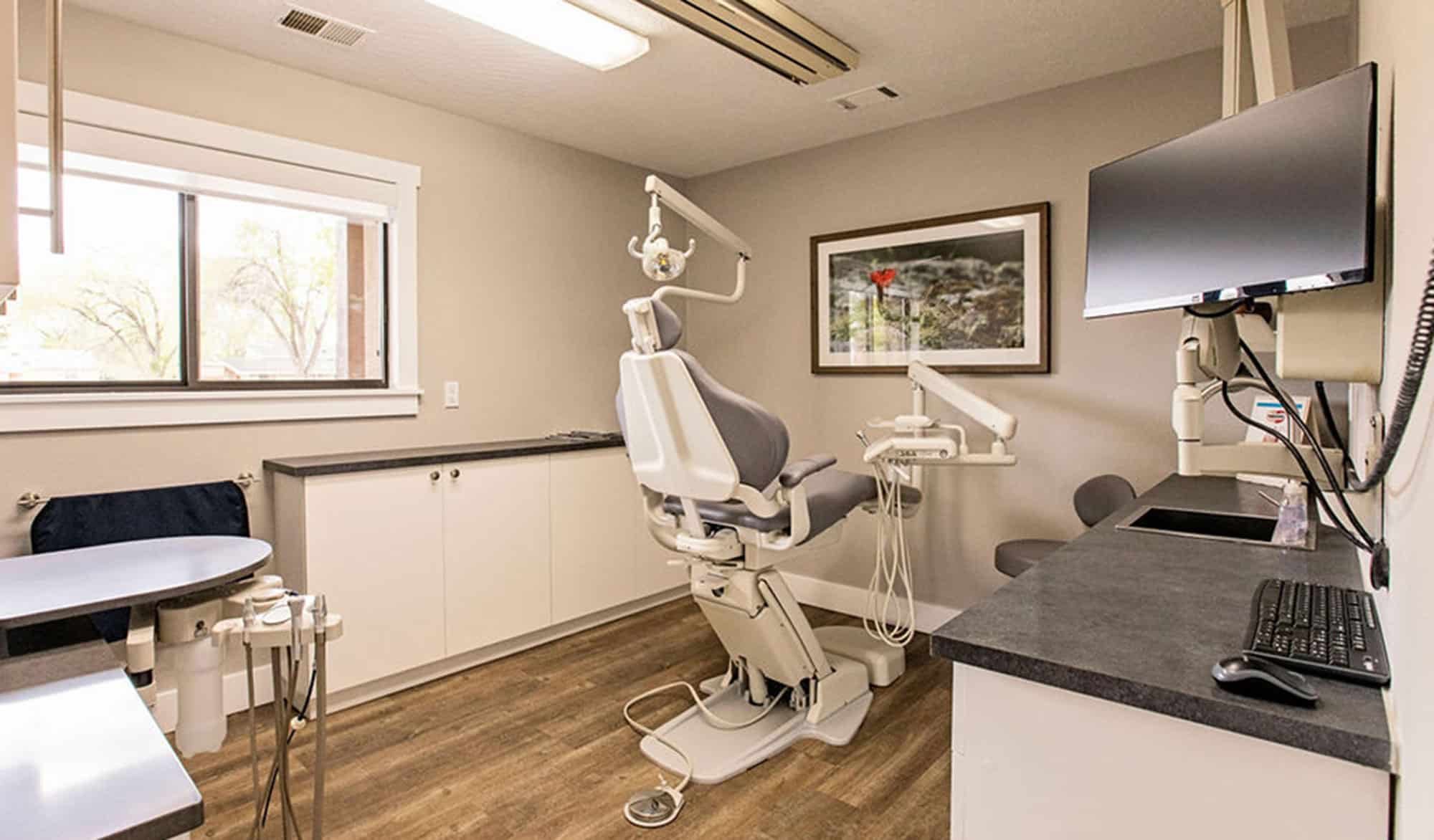Dental Implants
Restore Your Natural Smile With a Simple Surgical Procedure
What are Dental Implants?
Dental implants are a common and effective solution for replacing missing teeth. These medical devices serve as artificial tooth roots and include two main components: the dental implant body and abutment.
The implant system, usually made of biocompatible materials like titanium, is surgically implanted into the jawbone beneath the gums. Once in place, dental implants provide a stable foundation for dental prostheses, such as crowns, bridges, or dentures.
Dental implants have become increasingly common in recent years due to their numerous advantages over traditional tooth replacement options. They have revolutionized dentistry and are one of the best ways to replace missing or damaged teeth.
Types of Implants

Single Tooth Implants
Single-tooth dental implants replace a single missing tooth. They offer a solution that closely mimics natural teeth in appearance and function.

Implant Bridge
Implant bridges replace multiple adjacent missing teeth. They are a more stable alternative to traditional bridges, which rely on natural teeth for support.

Full Mouth Implants
Full mouth implants replace all the teeth in one or both jaws for patients who have lost most or all of their teeth due to decay, gum disease, or trauma.
Want more information on dental implants and other services we offer?
Why Choose Dental Implants?
Dental implants are a durable and long-lasting tooth replacement option. With proper care and maintenance, they can last for many years, if not a lifetime. Once an implant is in place, it can provide numerous benefits, especially regarding functionality and oral hygiene.
Restores Functionality
Dental implants closely mimic the appearance and function of natural teeth. They are custom-made to match the color, shape, and size of your existing teeth, providing a seamless and natural look. They also allow normal chewing and speaking to eat your favorite foods without restrictions.
Prevents Bone Loss
When a tooth is lost, the underlying jawbone can deteriorate over time due to lack of stimulation. Dental implants act as artificial tooth roots, helping preserve the bone and preventing bone loss. Furthermore, dental implants do not rely on adjacent teeth for support, maintaining the integrity of neighboring teeth.
Enables Normal Brushing & Flossing
Dental implants are easier to clean compared to some other tooth replacement options. With bridges or dentures, there can be gaps and hidden areas where food particles and plaque accumulate, increasing the risk of decay in nearby teeth. In contrast, dental implants are single units that can be brushed and flossed like natural teeth, promoting better oral hygiene.
Restores Natural Smile
Dental implants can provide a natural smile, making them one of the most aesthetically pleasing options for replacing missing teeth. They are custom-made to closely match your natural teeth’s color, size, and shape so they blend seamlessly after your procedure. Their enhanced comfort and stability also boost your confidence and self-esteem.
How The Process Works

Schedule a Consultation
The implant surgery process begins with scheduling a consultation with us at Montrose Family Dental. During this appointment, you’ll discuss your oral health, medical history, and any specific concerns or goals you have related to tooth replacement.
We will perform a thorough oral examination and discuss your treatment goals. Based on this conversation, we will develop a personalized treatment plan. This plan outlines the number of implants needed, their location, and the type of restoration (crown, bridge, denture) that will be used.

Undergo Surgery
If you decide to proceed with dental implants, the actual implant surgery is the next step.
You’ll receive local anesthesia to numb the area, ensuring you remain comfortable during the surgery. Then, a small incision is made in the gum tissue to expose the underlying jawbone. We will carefully drill a hole in the jawbone and place the dental implant into the prepared site.
Once the procedure is complete, we will allow osseointegration to occur before placing the abutment and attaching the implants.

Enjoy Your Smile!
With your dental implants in place and the final restoration attached, you’ll have a fully functional and aesthetically pleasing set of teeth. You can confidently bite, chew, and speak without concerns about the stability or appearance of your teeth. Your new smile will feel and look natural.
Additionally, we will schedule periodic follow-up appointments to monitor the health of your implants and address any concerns or adjustments that may be needed. These appointments are essential to ensure the ongoing success and longevity of your dental implants.
Take the first step to brighten your smile — contact Montrose Family Dental today!
How to Decide Whether Implant Surgery is Right for You
Deciding whether dental implant surgery is right for you involves considering various factors, including your oral health, individual circumstances, and personal preferences. However, you should never make this decision alone — an experienced dentist can answer all of your questions and guide you to the right path for your dental health.
At Montrose Family Dental, we are dedicated to providing the highest quality care for all of your dental needs. We are more than happy to help you decide whether dental implants make the most sense for you and your circumstances. When you schedule a consultation with us, we will evaluate your oral health, discuss your medical history, and assess your specific needs.
Some factors we evaluate for implant surgery include:
Your Overall Health
Your general health plays a significant role in determining if you are a suitable candidate for dental implant surgery. Before scheduling your implant surgery, we will discuss any underlying medical conditions, medications you are taking, and any lifestyle factors that could affect the success of the procedure.
Your Oral Health
Adequate gum health and sufficient bone density are essential for the success of dental implants. Before we schedule your dental implant surgery, Dr. Dan will assess the condition of your gums, remaining teeth, and jawbone. If there are issues such as gum disease or significant bone loss, these may need to be addressed beforehand.
Your Missing Teeth
Dental implants can replace a single tooth, multiple teeth, or even support full arches of teeth. The treatment plan will vary depending on your specific situation. Therefore, we will want to evaluate how many teeth you are missing and their location before deciding what type of dental implants you need and what approach makes sense.
Your Treatment Goals
Are you primarily concerned about aesthetics, function, or both? Your goals and expectations may influence how we handle your implant surgery. Therefore, we recommend you clearly communicate your desired outcome during the consultation so Dr. Dan can create a treatment plan tailored to your needs.
Cost and Insurance
Dental implant surgery and any associated procedures, such as bone grafting or extractions, come with their own individual costs. We will help you confirm whether your dental insurance covers any portion of this treatment. Depending on the total cost and your insurance, we can help you develop a payment plan that covers everything.
Alternative Options
Your oral health is important to us, and sometimes dental implants aren’t the best solution. Dr. Dan will help you compare the pros and cons of any possible alternatives to dental implants so you can decide which option aligns better with your needs and preferences. We will weigh the risks and rewards, along with the expected timeline.
What to Expect During Implant Surgery
Dental implant surgery is a well-planned and controlled procedure, and patients can generally expect a structured and relatively comfortable experience.
Here’s what you can typically expect during dental implant surgery:
Preparation
Before the procedure, you will have a consultation with your dentist or oral surgeon to discuss the treatment plan, answer any questions you may have, and address any concerns.
On the day of surgery, you’ll typically arrive at the dental office or oral surgery center with an empty stomach if you’ll be under sedation or general anesthesia. Follow any pre-operative fasting guidelines provided by your dental professional.
Anesthesia or Sedation
Most dental implant surgeries are performed using local anesthesia, which numbs the surgical area and prevents you from feeling pain during the procedure. In some cases, conscious sedation may be offered to help you relax and feel more comfortable during the surgery. You may be conscious but deeply relaxed, and your memory of the procedure may be limited.
For complex or lengthy procedures, you may be placed under general anesthesia.
Incision and Implant Placement
The dentist will make a small incision in the gum tissue at the site where the implant will be placed. Using precise instruments, they will create a hole in the jawbone to accommodate the dental implant. The dental implant, usually made of titanium, is carefully inserted into the prepared site. The incision may be stitched closed, or in some cases, self-dissolving sutures may be used.
Osseointegration
After the implant is placed, there is a healing period of several months (typically 3-6 months) during which osseointegration occurs. This is the process where the implant fuses with the surrounding jawbone, providing stability and anchorage.
Abutment Placement
Once osseointegration is complete, a minor surgical procedure may be necessary to expose the implant and attach an abutment. The abutment is a connector piece that protrudes above the gumline and serves as the attachment point for the final restoration.
Impressions and Restoration
After the abutment is in place, impressions are taken of your mouth to create a custom-made dental crown, bridge, or denture. The final restoration is then affixed to the abutment, completing the dental implant process.
Post-Operative Instructions
Following the surgery, you will receive post-operative care instructions, including guidelines for pain management, oral hygiene, and dietary restrictions, if any. Montrose Family Dental will schedule follow-up appointments to monitor your progress and ensure the implants are healing correctly.
Recovery and Healing
Most patients experience some degree of swelling, discomfort, and minor bleeding immediately after surgery. These symptoms typically subside within a few days. You may be prescribed pain medication and/or antibiotics to manage pain and prevent infection.
Why Choose Montrose Family Dental?
At Montrose Family Dental (MFD), our primary objective is to make a transformative impact on the lives of individuals seeking dental implant solutions. We are committed to delivering personalized care that not only enhances oral health but also achieves outstanding functional and aesthetic results. At MFD, our approach to patient care centers on fostering a strong, collaborative relationship with you. Our goal is to understand your oral health aspirations and overall wellness objectives.
When You Partner With Montrose Family Dental, You Receive:
High-Quality Dental Services
A standard of excellence in personalized dental care enables us to provide the quality dental services our patients deserve and trust. We provide comprehensive treatment planning and use preventative, restorative, and cosmetic dentistry to achieve your optimal dental health. Should a dental emergency occur, we make every effort to see and care for you as soon as possible.
Uncompromised Safety
Infection control in our office is also very important to us. To protect our patients and ourselves, we strictly maintain sterilization and cross-contamination processes using standards recommended by the American Dental Association (ADA), the Occupational Safety and Health Administration (OSHA), and the Center for Disease Control (CDC).
A Positive Experience
Building a foundation of trust by treating our patients as special individuals is vital to our success. We understand how uneasy some patients may feel about their dental visits and how we can make a difference in providing a relaxing and positive experience. Our entire team is dedicated to providing you with excellent, personalized care and service to make your visits as comfortable and pleasant as possible.